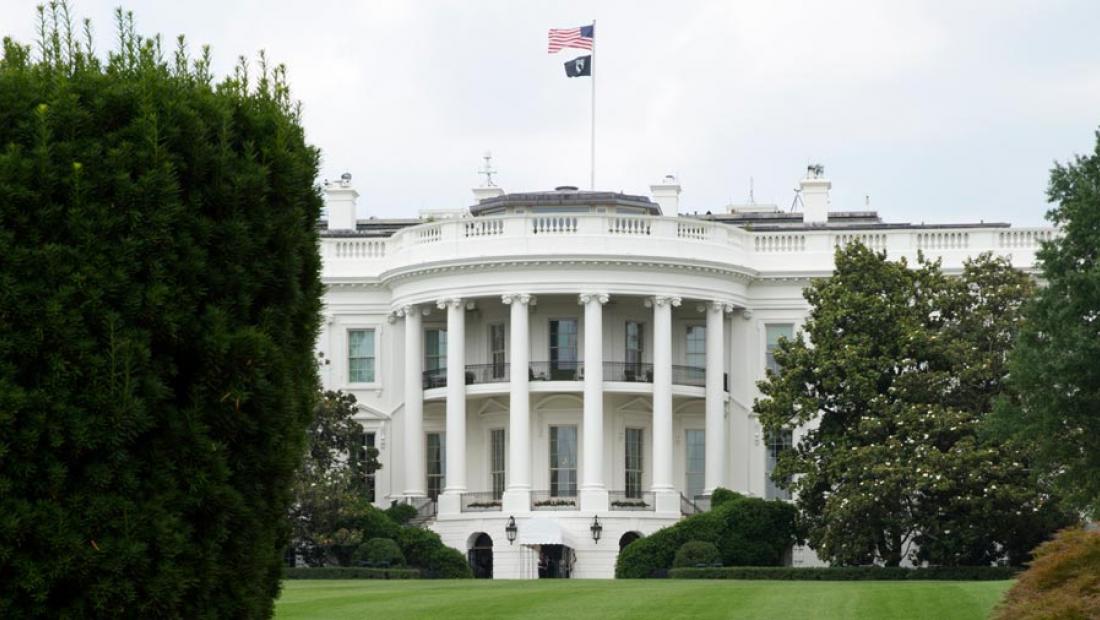Digital Music Licensing Remake is Now Law

The smarter way to stay on top of broadcasting and cable industry. Sign up below
You are now subscribed
Your newsletter sign-up was successful
President Donald Trump Thursday (Oct. 11) signed the Hatch-Goodlatte Music Modernization Act, which updates the music licensing framework for the digital age and provides congressional overnight of a Justice Department review of long-standing consent decrees with ASCAP and BMI.
While the bill includes providing payments for previously uncompensated artists, the President joked that he should have gotten some free music out of the musicians in attendance.
Among those at the signing ceremony, in addition to the requisite legislators and administration officials, were Beach Boy Mike Love, Kid Rock, and John Rich of Big & Rich.
President Trump signaled that if the DOJ review of the consent decrees leads to a decision to lift them, he would try to provide notice to Congress, but was giving no guarantees depending on the circumstances. "My Administration will strive to provide the Congress with notice in advance of such filings," he said, but added: "Consistent with the separation of powers and my constitutional responsibility to take care that the laws be faithfully executed, however, my Administration does not understand section 105 to require advance notice in the unusual cases when immediate action related to litigation is required."
The act incorporates a trio of bills. The base Modernization Act creates a single licensing entity for reproduction rights for digital uses, like those of Spotify, Pandora, Google, Apple and Amazon. It also randomly assigns judges to preside over ASCAP and BMI rate-setting cases.
Related: Senate Judiciary Approves Music Licensing Bill
The package also includes The CLASSICS (Compensating Legacy Artists for their Songs, Service, and Important Contributions to Society) Act, which compensates artists for pre-1972 recordings that had previously not been eligible for digital royalties from services like Pandora and Spotify.
The smarter way to stay on top of broadcasting and cable industry. Sign up below
Then there was the AMP (Allocation for Music Producer) Act, which allows for direct payment of royalties to music producers and engineers.
“Though the way we listen to music may change over time, the lasting mark music creators from all generations leave with us does not,” said Sen. Charles Grassley (R-Iowa), chairman of the Judiciary Committee. “This broadly bipartisan package ensures that all music creators have the access to the royalties they’ve earned and that music lovers can better access these works of art. Thanks to the hard work of Senator Hatch and other colleagues, and President Trump’s support, we’ve addressed problems for these communities that have been entrenched for 15 years with this much-needed solution and reform package.”
"NAB is grateful for President Trump’s signature on the Orrin G. Hatch-Bob Goodlatte Music Modernization Act, thus culminating a years-long process to find consensus solutions to music licensing issues," said National Association of Broadcasters CEO Gordon Smith. "This important legislation will benefit songwriters, legacy recording artists, producers, digital streaming services, and music listeners."
“This is truly a historic moment for the music industry, especially for the American songwriters and composers at its core, who will see significant and deserved benefit from this legislation," said BMI president and CEO Mike O’Neill.
“Thanks to the unrelenting efforts of our ASCAP music creator and publisher members, industry partners and champions in Congress, a more sustainable future for songwriters is finally within reach," said ASCAP CEO Elizabeth Matthews.
"Songwriters across this country now and in the future will remember those who fought so hard for the Music Modernization Act—both in Congress and across the music industry," said ASCAP chairman and songwriter Paul Williams.
"Songwriters have for too long labored without seeing fair rates and receiving all that they deserve, and for the first time in history, the music industry has partnered with the tech industry to fix these systemic problems," said National Music Publishers' Association president David Israelite.
“The Music Modernization Act moves the music industry into the streaming age and benefits consumers, creators and copyright owners," said Chris Harrison, CEO of the Digital Media Association. "A modern industry requires a modern solution. The MMA finally brings our music licensing laws into the 21st century and ensures greater transparency and efficiency across the entire music ecosystem.”
“Today is a momentous day for the entire music community as the Music Modernization Act is signed into law, said musicFIRST coalition Executive Director Chris Israel. "This achievement has been years in the making and only possible thanks to powerful advocacy from every facet of the music community. It was a movement that rose above politics and partisanship and resulted in a more effective and efficient legal framework for digital music services. Its incredible what the music community can do when we are united in voice and cause."
"This bipartisan legislation is proof that consensus is achievable among all music industry stakeholders — songwriters, recording artists, digital music companies, broadcasters and consumers," said the MIC Coalition. "This critical reform — which includes important provisions to ensure Congressional oversight as the Department of Justice continues with its ongoing review of the ASCAP and BMI consent decrees — should serve as a model to address other longstanding music licensing issues, including the pursuit of transparency and efficiency in the multi-billion dollar performing rights licensing industry."
Contributing editor John Eggerton has been an editor and/or writer on media regulation, legislation and policy for over four decades, including covering the FCC, FTC, Congress, the major media trade associations, and the federal courts. In addition to Multichannel News and Broadcasting + Cable, his work has appeared in Radio World, TV Technology, TV Fax, This Week in Consumer Electronics, Variety and the Encyclopedia Britannica.

